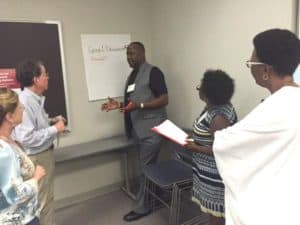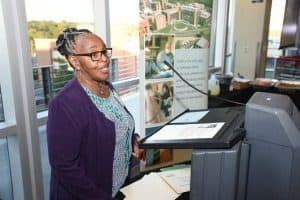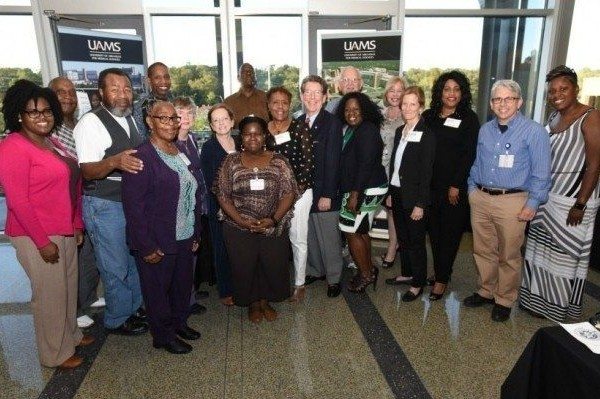
Seventeen Arkansans were recently recognized for their participation in the first UAMS Community Scientist Academy.
The UAMS Translational Research Institute piloted the academy to help citizens better understand how research is done at UAMS and to prepare them for bigger roles as volunteers. A second Community Scientist Academy is being planned for spring 2017.
The graduation ceremony Sept. 29 included remarks from UAMS research leaders Kate Stewart, M.D., M.P.H., and Mary Aitken, M.D., M.P.H., and statements of appreciation from several participants. Stewart leads the Translational Research Institute’s Community Engagement program. Aitken is a veteran community-based researcher who is well known for injury prevention work, especially ATV safety. She also co-leads the Translational Research Institute’s KL2 Mentored Research Career Development Award program to help train the next generation of translational researchers.
Willy Wade Jr., founder and executive director of Difference Makers in Hot Springs, said what he learned about research at the academy can help him better serve poor
communities.
“I’ve been appointed to a few boards that are doing some research, so these tools will come in very handy in helping us determine different ways we want to tackle some problems and issues,” Wade said.
During weekly evening classes, attendees learned about the types of research at UAMS and steps in the study process, including Institutional Review Board approval to ensure the safety and ethical treatment of research participants. Each week they heard from UAMS researchers who were invited to share their stories, and they had small-group activities, such as discussing research questions and brainstorming their own research study ideas and methods. For example, one group discussed ways to study potential solutions to what Wade described as the “disconnect” that prevents the poorest, often older citizens from receiving needed services.
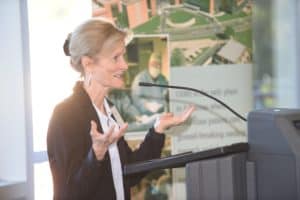
Academy graduate Onie Norman of Dumas, thanked UAMS for the academy. “I’ve learned so much,” she said. “There were some things I thought I knew but found out I didn’t know. This has been a really good benefit for me, and I hope you all continue to have more of these types of programs.”
Academy graduate Larry Taylor, of Little Rock, has been a UAMS volunteer on several projects. He participated in a rare diseases study as the father of a son with cystic fibrosis. He also chairs the UAMS Medical Center Patient and Family Advisory Council and serves as an adjunct professor in the College of Health Professions.
“I just thoroughly enjoy knowing what’s going on and learning new things,” Taylor said.
Both Stewart and Aitken noted the symbolism of hosting the graduation ceremony at the College of Public Health. It was held in Bruce Commons on the first floor, which was named for the late Thomas Bruce, M.D., D.Sc., first dean of the college.
“He really made sure the college was based on the idea that community lies at the heart of public health,” Stewart said. “He’s the reason we’re here, because of his vision for incorporating community into everything that we do and always making sure that we’re listening and partnering.”
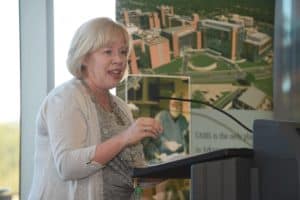
“This academy is part of his legacy,” said Aitken, who served with Bruce on the college’s planning committee before it was established in 2001.
She told the group that when she began conducting community engaged research 20 years ago, she quickly realized she had a lot to learn. Aitken had come to Arkansas from Seattle and had never seen an ATV but was embarking on a plan to prevent ATV injury and death. As a pediatrician with a noticeably different accent, she discovered that she wasn’t effective with her safety message in rural Arkansas.
“Sometimes as a researcher you have to learn that you’re not the right messenger,” she said. “I could have all the right information but I wasn’t the person to deliver it, so I hired a gentleman who was a hunter from the Delta area of the state, and he was very successful.”
In another learning experience, Aitken said she was skeptical when her staff bought ATV covers as giveaways at events where they
took their safety message. At a rodeo, she said, a man attending the event told them he had first assumed their intent was to take away people’s ATVs. Then he saw they were giving away ATV covers, so he understood that wasn’t the case.
“That was an ‘aha’ moment for me,” she said.
The idea for the Community Scientist Academy came from Sarah Facen, of Little Rock, a member of the Translational Research Institute Community Advisory Board.
“I am very happy to have seen this academy move forward,” she said. “It has been a privilege for me to serve on this board because the Translational Research Institute absolutely listens to the community.”

